The Best Hardwood Floor Cleaners
Many people shy away from owning hardwood floors because they are afraid that they are too fragile and difficult to clean. However, that’s simply not true.
A well-cared-for hardwood floor can withstand anything, including tracked-in dirt, spills, abuse from the kids, and pet messes. In fact, wood floor care is quite easy. Caring for your floors will add thousands of dollars of property value to your space!
Regular vacuuming is usually the best way to care for your hardwood floors. Vacuuming removes the gritty, fine, abrasive dust known to scratch the wood floor’s finish. In addition to regular vacuuming, you want to use cleaning products to clean the floor while protecting the finish.
When you choose the right cleaning product to clean your hardwood floors, you’ll do the job easier and faster while extending the life of your hardwood floors at the same time. After all, a clean floor is a healthy floor.
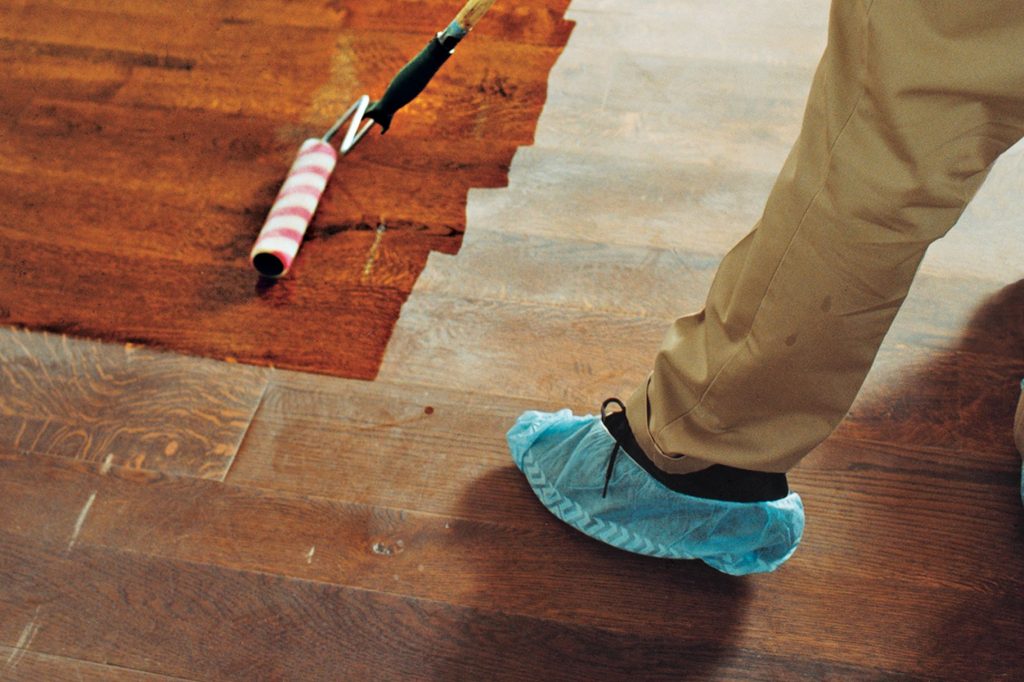
In this article, Philadelphia’s hardwood flooring experts from Artisan Wood Floors outline the nine best hardwood floor cleaners for 2023.
As hardwood flooring experts, the team at Artisan Wood Floors is often asked about their recommendations for the best wood floor cleaners. The best wood floor cleaners are the ones that are formulated specifically for hard, surface-finished, and polyurethane-treated floors. These cleaners have the ingredients to dissolve grime and dirt without damaging the floor’s coating or dulling its shine.
Please note that none of these cleaners should be used on hardwood floors treated using wax or other penetrating finishes. This list of the best wood floor cleaners includes recommendations for two wood floor vacuum cleaners.
1. Bona Hardwood Floor Cleaner Spray
Bona Hardwood Floor Cleaner Spray is great because it quickly removes sticky residues and shoe marks from hardwood floors. The Bona Hardwood Floor Cleaner Spray can cut through soil and erase shoe marks more rapidly than any other wood floor cleaning product. You can apply the cleaner with Bona’s cleaning pad, use a mop with a microfiber pad, or use the official Bona Spray Mop.
2. Murphy’s Oil Soap Original Wood Cleaner
Murphy’s Oil Soap Original Wood Cleaner is another great product for removing sticky residues and shoe marks from your hardwood floors. Best of all, it is the most affordable cleaner on this list! Because it is concentrated, Murphy’s Oil Soap lasts quite a while, so you know you are getting the best bang for your buck. Remember, Murphy’s Oil Soap is concentrated and must be diluted before use.
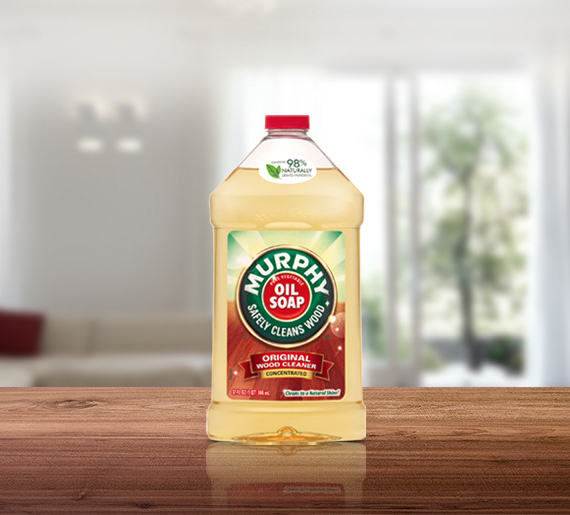
3. Black Diamond Wood & Laminate Floor Cleaner
Black Diamond’s Wood & Laminate Floor Cleaner removes tricky scuff marks and is perfect for spot-cleaning your hardwood floors. Its trigger makes the application a sinch, and the product’s clear instructions make it easy to use. Best of all, it is appropriate for use on both finished hardwood floors and laminate floors as well.
4. Swiffer WetJet Wood Starter Kit
The Swiffer WetJet is great because it offers disposable pads that make cleanup easy and easily navigable under and around furniture. This great product dispenses the wood floor cleaner directly to the floor using a battery-powered mop. It uses a textured disposable pad with a scrub strip to tackle grime and dirt. The best thing about disposable pads is that they eliminate the need to store dirty mop. The downside is that you have to continue buying refills.
5. Bona PowerPlus Hardwood Floor Deep Cleaner Spray
The EPA’s Safer Choice program certified this powerful deep cleaner, which leaves no sticky residue behind. In addition to having ingredients that won’t harm your family or the environment, the product’s fast-drying, oxygenated formula penetrates heavy hardwood floor build-up. Sold in a convenient spray bottle, it requires no diluting. It is approved for use on any polyurethane-finished wood floor. Follow its instructions carefully, as the Bona PowerPlus Hardwood Floor Deep Cleaner Spray is not for use on oiled or waxed wood floors.
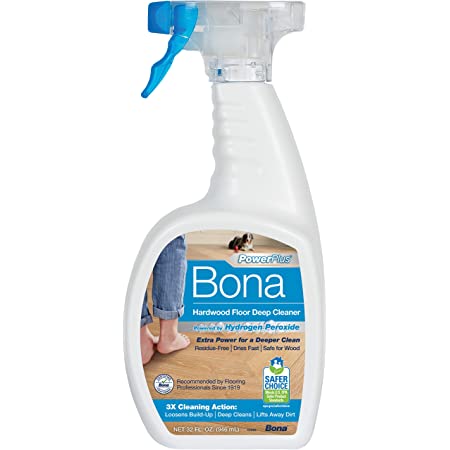
6. Libman Hardwood Concentrated Floor Cleaner
Libman Hardwood Concentrated Floor Cleaner dissolves difficult scuff marks and removes sticky residues. Mix the cleaner with water to dilute, either in your mop bucket or using Libman’s Freedom Dispensing Microfiber Mop. Either way, it packs a powerful punch. The bottle has a convenient handle and measuring cup for ease of use. One bottle can make up to four gallons of floor cleaner. If you’re looking for the best hardwood floor mop, this is a great product to go with whatever you choose.
7. Bona Hardwood Floor Premium Spray Mop
The easy-to-use Bona Hardwood Floor Premium Spray Mop features an oversized head to cover more ground and uses a reusable microfiber pad. It easily navigates narrow spaces, and its soft, flexible corners flip up along baseboards and walls to catch each speck of dirt. The refillable cleaner cartridge is less wasteful, and the mop can dispense a fine, wide spray evenly across your floor.
8. Dyson Omni-glide Cordless Vacuum Cleaner
This lightweight and rechargeable Dyson stick vacuum is perfect for hardwood floors. Its soft and fluffy rollers go in any direction. The vacuum rollers easily pick up fine particles and large debris without scratching the hardwood floor. It is the right size vacuum for stair treads, room edges, and those spaces around your area rugs.

9. Miele Compact C1 Turbo Team Bagged Canister Vacuum
This pricey vacuum is easy to use and glides smoothly across floors. It is a top performer for all types of wood floor debris and works on carpeting, too. Its three-filter system ensures that the dust from your wood floor doesn’t get recycled into the air only to find its way back to your wood floor.
Frequently Asked Questions About Cleaning Hardwood Floors
In addition to recommendations on the best hardwood floor cleaners in 2023, here are some of the most frequently asked questions that the team at Artisan Wood Floors receives regarding how to clean hardwood floors:
1. How often should I clean my hardwood floors?
The frequency of cleaning depends on various factors, such as foot traffic, the presence of pets, and the level of dust in your home. Generally, it’s advisable to sweep or vacuum high-traffic areas daily to prevent dirt and debris from scratching the surface. Damp mop your floors weekly or as needed to remove more stubborn dirt.
2. Can I use a regular vacuum on hardwood floors?
Yes, but using a vacuum with a setting specifically designed for hardwood floors is crucial. Hardwood floors are susceptible to scratches, and using a vacuum with a beater bar for carpets can cause damage. Alternatively, consider using a soft-bristle brush attachment.
3. Is it safe to use water on hardwood floors?
Yes, using water on hardwood floors is safe, but moderation is key. Excessive moisture can lead to warping and moisture damage to the wood. Use a damp mop, not a wet one, and wipe up spills promptly to prevent any potential issues.
4. What cleaning products are generally safe for hardwood floors?
It’s recommended to use pH-neutral, hardwood floor-specific cleaners. Avoid harsh chemicals, ammonia, and vinegar, as they can strip away the finish and damage the wood over time. Always follow the manufacturer’s recommendations for cleaning products. All of the products featured in our list of the best hardwood floor cleaners for 2023 are safe for hardwood floors.
5. How can I remove tough stains from hardwood floors?
For stubborn stains, start with a damp cloth and a small amount of hardwood floor cleaner. Consider using vinegar and water or a specialized hardwood floor stain remover if the stain persists. Test any cleaning solution in an inconspicuous area first to ensure it won’t harm the finish.
6. Can I use a steam mop on hardwood floors?
It’s generally not recommended to use a steam mop on hardwood floors. The moisture and heat can penetrate the wood, causing it to swell and potentially leading to long-term damage. Stick to a damp mop for regular cleaning.
7. How can I prevent scratches on my hardwood floors?
Preventing hardwood floor scratches involves a combination of proactive measures. Use furniture pads under chairs and table legs, avoid dragging heavy furniture, and regularly trim your pet’s nails. Place rugs in high-traffic areas to minimize wear and tear.
8. Can I use oil-based cleaners on hardwood floors?
Avoid using oil-based cleaners on hardwood floors, as they can leave a residue and dull the finish. Stick to water-based or pH-neutral cleaners specifically formulated for hardwood floors.
9. Can I use a homemade cleaning solution for hardwood floors?
While homemade solutions like vinegar and water are often suggested, they may not be suitable for all hardwood floors. Some finishes and types of wood are sensitive to acidic substances. If opting for a DIY solution, test it in an inconspicuous area first. Additionally, ensure the solution is well-balanced and won’t harm the floor’s finish over time. Commercial hardwood floor cleaners are generally a safer choice.
10. How do I deal with humidity and hardwood floors?
Wood is sensitive to changes in humidity, which can lead to expansion or contraction. Maintain a consistent indoor humidity level between 30% and 50%. Use a humidifier in dry conditions and a dehumidifier in humid conditions to help regulate the environment.
11. How do I protect my hardwood floors during a home renovation?
Home renovations can expose hardwood floors to dust, debris, and potential damage. Use protective coverings such as rosin paper or cardboard to shield the floors during construction. Clean the floors regularly during the renovation, and once the work is complete, consider a professional cleaning and inspection to address any potential issues.
12. Should I refinish my hardwood floors, and how often?
The need for refinishing depends on factors such as wear, scratches, and the overall condition of the finish. You might need to refinish in high-traffic areas every 3-5 years. However, you may only need to refinish hardwood floors in lower-traffic areas every 7-10 years. Regular cleaning and proper maintenance can extend the time between refinishing.
13. What should I do if my hardwood floors become discolored?
Discoloration can result from various factors, including sunlight exposure, spills, or pet accidents on your hardwood floors. If the discoloration is mild, you may try using a specialized hardwood floor cleaner. For more severe cases, it might be necessary to consult a professional to assess if refinishing or a deeper cleaning is required.
Conclusion
If you are still struggling to remove your ground-in grime with the best hardwood floor cleaners for 2022, or for those years-old stains, you may need a hardwood sanding and refinishing – for all questions about hardwood, call Artisan Wood Floors today at (215) 515-7355 and ask for Steve!
Recent Hardwood Flooring Projects in Philadelphia & NJ
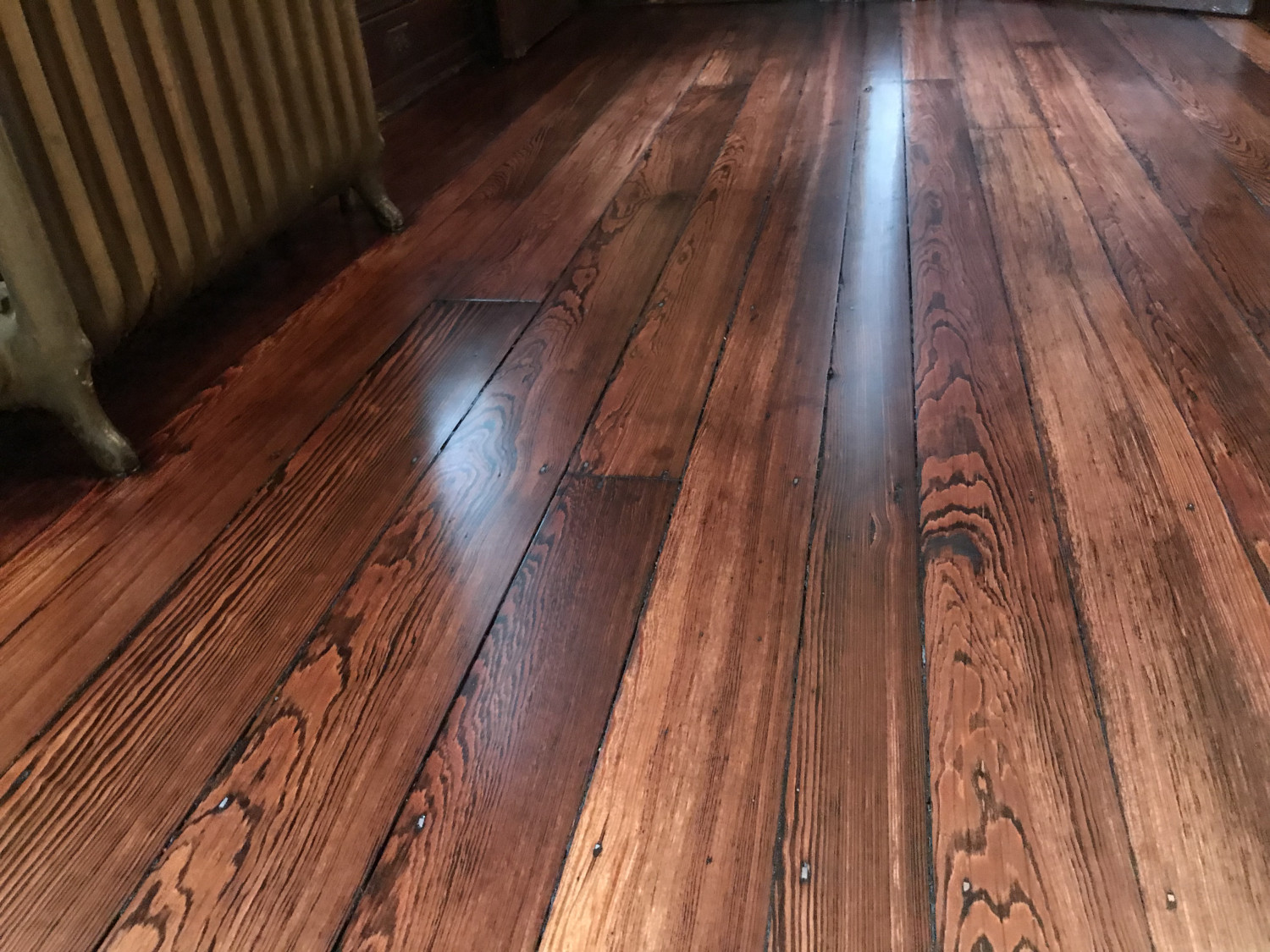
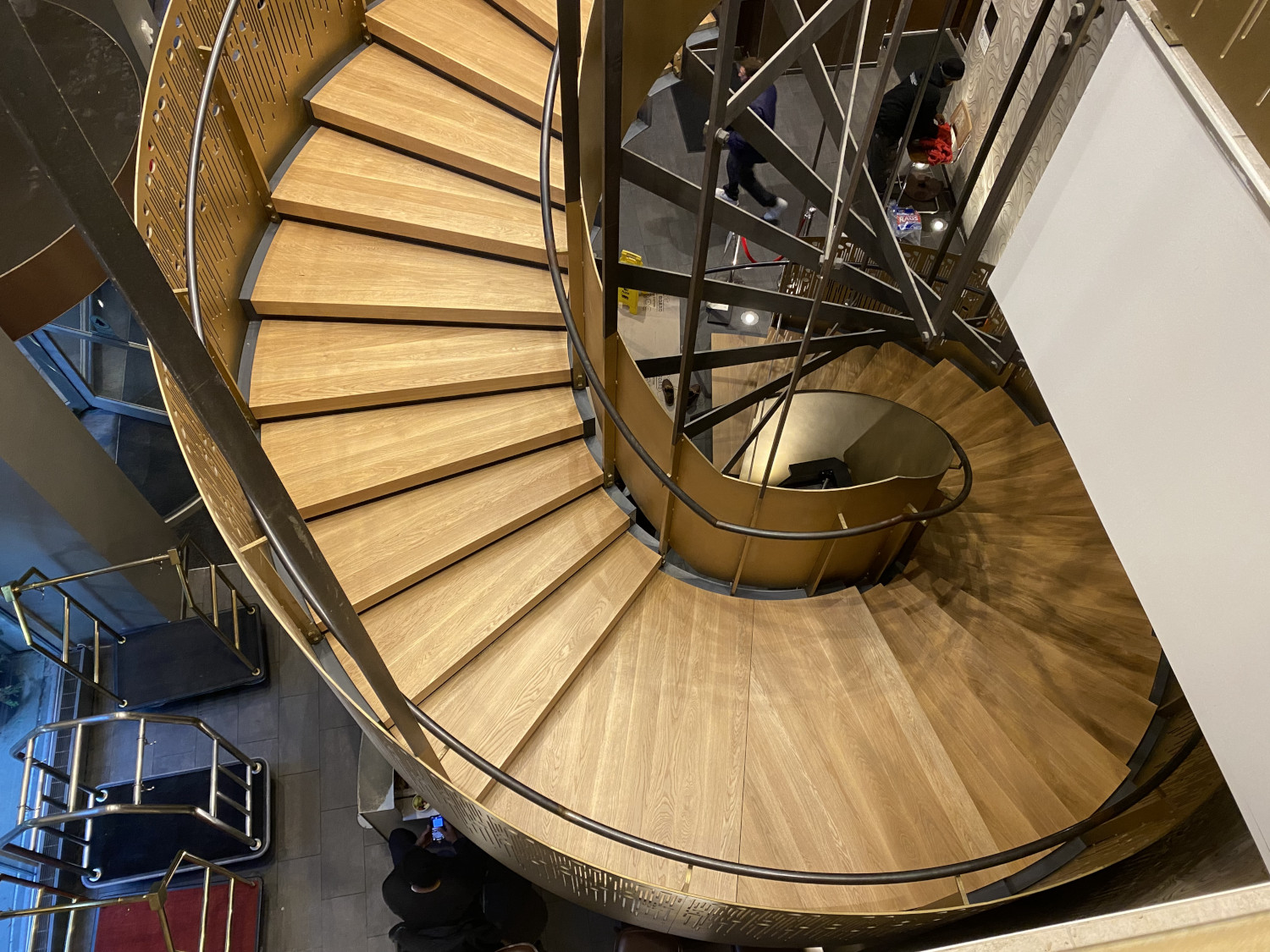
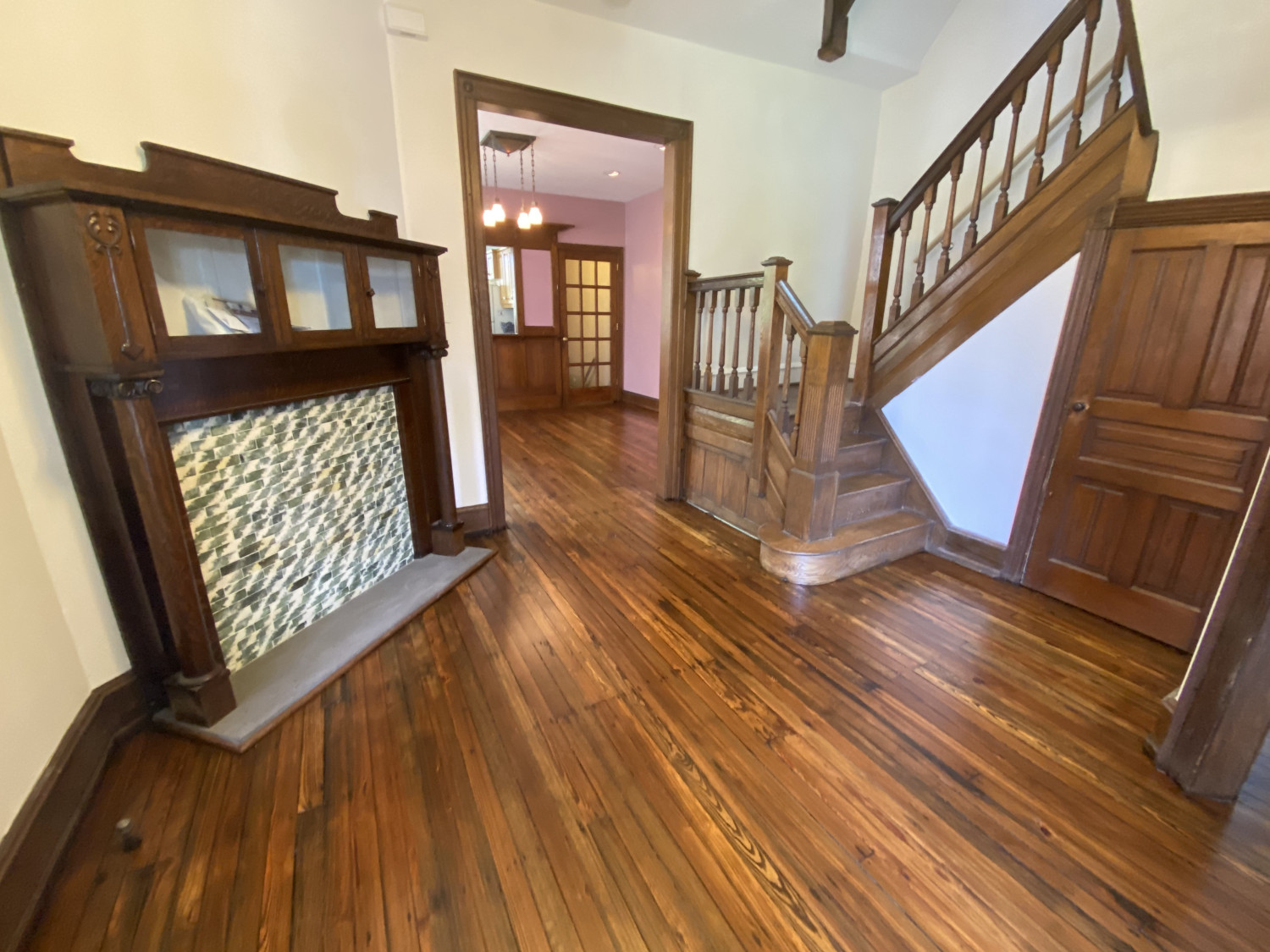

0 Comments